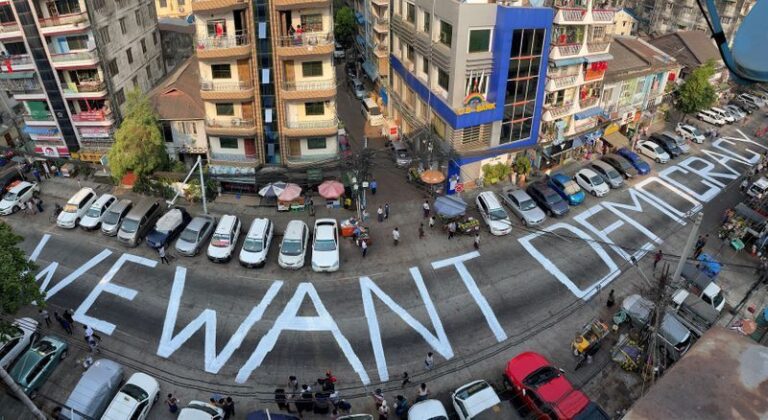
(Reuters) – Myanmar was set for more street protests on Wednesday against military rule while Indonesia’s efforts steer a path out of the crisis with the help of other Southeast Asian countries appeared to falter with a proposed diplomatic visit scrapped.
This week saw huge rallies and a general strike on Monday to denounce the military’s Feb. 1 coup and demand the release of elected leader Aung San Suu Kyi, despite a warning from authorities that confrontation could get people killed.
On Tuesday, gatherings were smaller overall but a rally by members of members of different ethnic minorities was taking place in the commercial hub of Yangon, with civil servants from the energy ministry joining in.
“We ethnic minority people haven’t had the chance to demand our rights but now we do,” said San Aung Li, 26, a member of the Kachin minority.
“So I’m supporting the protest as all ethnic people are, with one voice.”
With the protest and a civil disobedience movement paralysing life in Myanmar, Indonesia has been trying to find a way out.
Sources said it proposed a plan centred on members of the Association of South East Asian Nations (ASEAN) sending monitors to ensure the generals stick to their promise to hold fair elections.
The military has not given a time frame for a new election but it imposed a one-year state of emergency when it seized power so it would likely be after that.
But Suu Kyi’s party, which swept a Nov. 8 election that the military says was marred by fraud, and its supporters want its victory recognised.
Indonesia’s foreign minister, Retno Marsudi, is in Thailand and had been expected to fly to Myanmar but that trip was off, her ministry said.
“After taking into account current developments and the input of other ASEAN countries, this is not the ideal time to conduct a visit to Myanmar,” Indonesian foreign ministry spokesman, Teuku Faizasyah, told a briefing in Jakarta.
On Tuesday, hundreds of protesters gathered outside Indonesia’s embassy in Yangon to voice opposition to a new election, demanding that the votes they cast in November be recognised.
The army seized power after alleging fraud in the November elections, detaining Suu Kyi and much of the party leadership. The electoral commission dismissed the fraud complaints.
The Future Nation Alliance, a Myanmar-based activist group, said earlier in a statement a visit by Retno would be “tantamount to recognising the military junta”.
The group demanded foreign officials meet Htin Lin Aung, a member of a committee representing ousted lawmakers, who has been appointed the “sole responsible official for foreign relations”.
‘HELD TO ACCOUNT’
Indonesia’s efforts to resolve the crisis comes as international concern is growing.
The Group of Seven (G7) rich nations on Tuesday condemned intimidation and oppression of those opposing the coup. “Anyone responding to peaceful protests with violence must be held to account,” group foreign ministers said in a statement.
Western nations sought to increase pressure on the junta this week with the European Union warning it was considering sanctions that would target businesses owned by the army.
The United States imposed sanctions on two more members of the junta and warned it could take more action.
China, which has traditionally taken a softer line, said international action should contribute to stability, promote reconciliation and avoid complicating the situation, media reported.
Military chief General Min Aung Hlaing has called for state spending and imports to be cut and exports increased to revive what he called an ailing economy.
He did not link the protests to economic problems but said the authorities were following a democratic path in dealing with them and police were using minimal force, such as rubber bullets, state media reported.
Security forces have shown more restraint compared with earlier crackdowns against people who had pushed for democracy during almost half a century of direct military rule.
Even so, three protesters have been shot and killed. The army has said one policeman died of injuries sustained during the protests.






